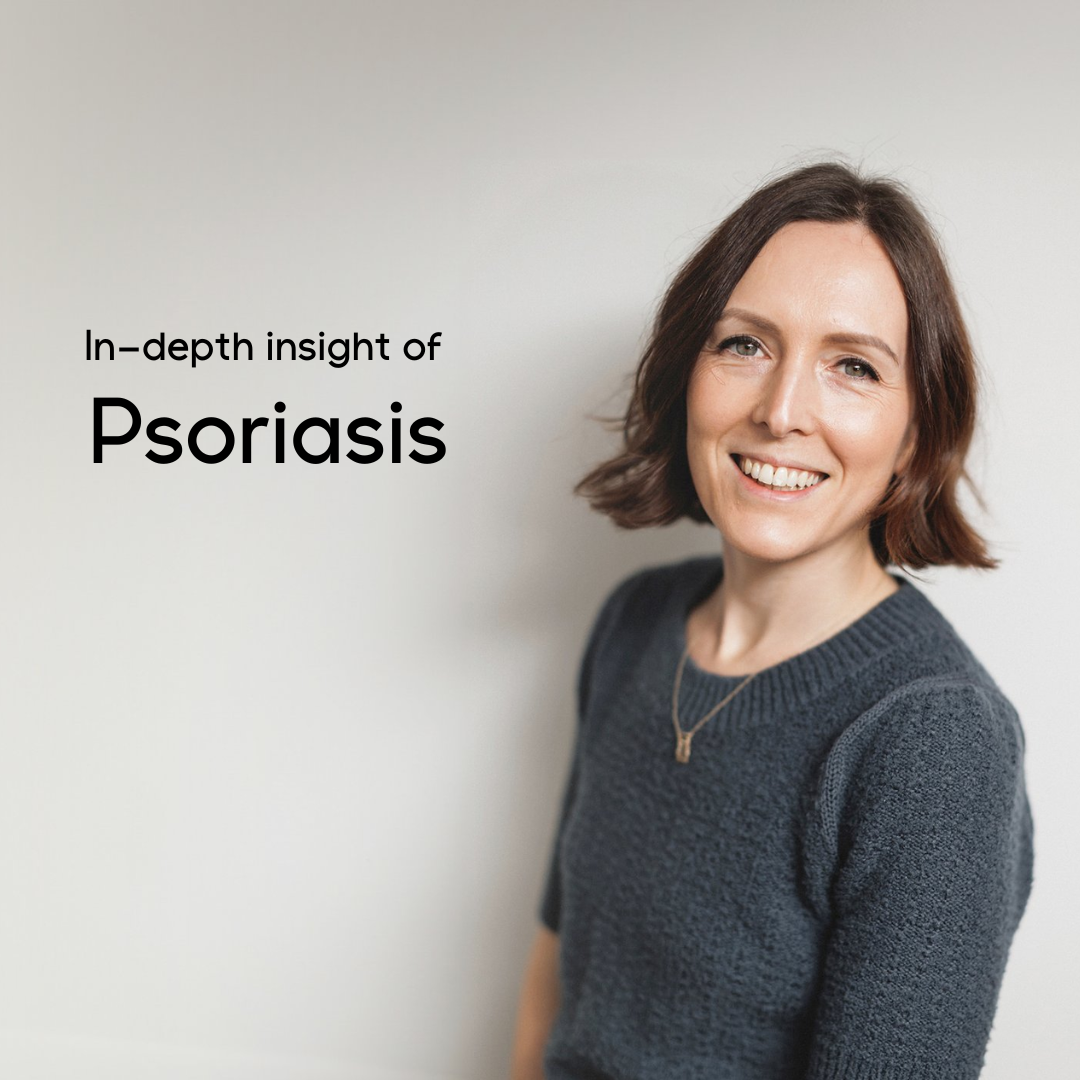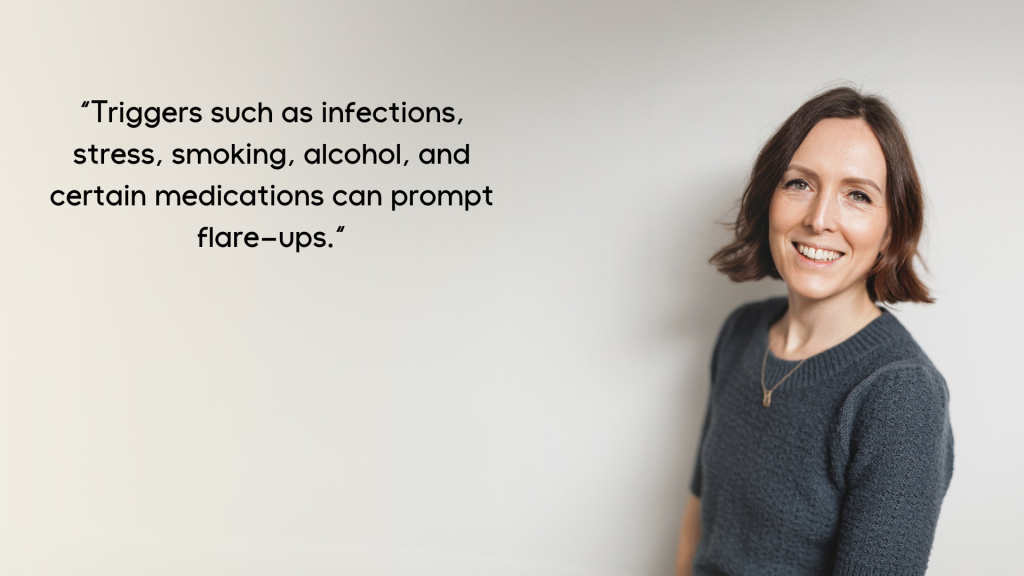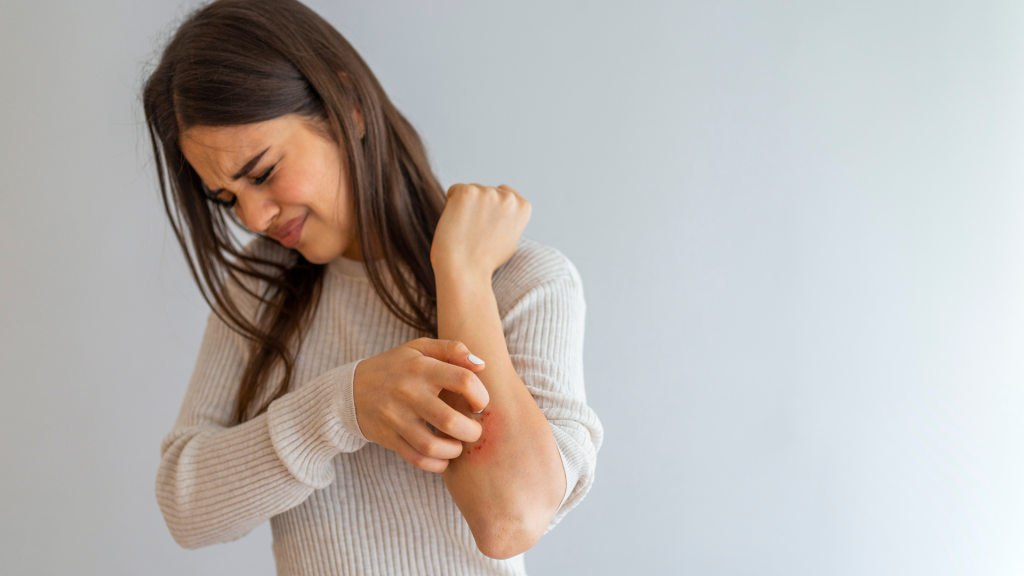

Psoriasis is more than just a skin condition—it’s a visible reminder of an internal struggle, a chronic condition that affects not only physical health but also mental and emotional well-being.
For many, the battle with psoriasis is lifelong, impacting confidence, self-esteem, and quality of life. As someone who has walked this path, my mission is to help others navigate their journey to healing, understanding that true remission comes from addressing the whole person, not just the symptoms.
I wasn’t always aware of the deep connection between diet, lifestyle, and health. Growing up, I was a very well child, but things changed when I was 13. After a knee injury, I was prescribed strong antibiotics to prevent infection, which led to severe stomach issues and a decline in my skin health. In my teenage years, acne took a toll on my confidence, but at the time, I had no idea about the gut-skin axis or how my internal health was affecting my outward appearance.
Like many in their twenties, I led a busy, high-stress lifestyle—juggling work, social commitments, and a less-than-ideal diet. It wasn’t until the birth of my first child, aged 27, that my body began to show the strain. Shortly after navigating the challenges of early motherhood and dealing with chronic stress, I became severely ill with a strep infection. Two weeks later, I noticed the appearance of small, drop-shaped lesions on my body and was quickly diagnosed with guttate psoriasis. My GP assured me that the condition would clear up soon, but months later, I was still covered in red, scaly patches. The only treatment offered was a variety of creams, and I was told there was nothing more I could do to help myself. I received no information about autoimmune conditions or how this diagnosis might affect my long-term health. At the time, I was also unaware of the profound impact stress could have on my condition.
It was at that point I decided to take things into my own hands. I began exploring alternative routes like acupuncture, herbal medicine, and, most significantly, a complete lifestyle overhaul. This journey eventually led me to study nutritional therapy and specialise in skin conditions like psoriasis. Today, I help others manage their psoriasis, combining the power of nutrition with lifestyle changes and a focus on the mind-body connection.
Psoriasis is a chronic autoimmune disease that primarily affects the skin, leading to red, scaly patches or plaques. This immune-driven condition is characterised by periods of flare-ups and remission.1 The condition accelerates the skin cell growth cycle, causing an overproduction of
skin cells that build up into visible patches. These patches can appear anywhere on the body but are most commonly found on the scalp, elbows, knees, and torso. Psoriasis is not just a skin condition—it is linked to systemic inflammation, increasing the risk of other health issues such as metabolic syndrome, anxiety, depression, and inflammatory bowel disease.2 An estimated 2.8% of the UK population is affected by psoriasis.3
Although the exact cause of psoriasis is still not fully understood, it is thought to arise from a combination of genetic, environmental, and immune-related factors.4 Triggers such as infections, stress, smoking, alcohol, and certain medications can prompt flare-ups. Chronic inflammation, driven by an overactive immune response, plays a central role in the condition. While psoriasis primarily affects the skin, its impact often extends to other body systems, which makes addressing underlying causes—such as inflammation and gut health—essential. A holistic approach that includes lifestyle and dietary changes, alongside conventional treatments, is key to long-term management.

There are several types of psoriasis, each presenting with different symptoms:

Since psoriasis is an autoimmune disease, it involves a misguided immune response, attacking the skin cells. Living with psoriasis also means a heightened risk of developing additional autoimmune conditions,6 some of which can be more serious or debilitating, such as rheumatoid arthritis, lupus, or multiple sclerosis. This interconnectedness of autoimmune diseases can affect multiple areas of health, potentially leading to systemic inflammation and complications in the cardiovascular, digestive, and neurological systems. Therefore, managing psoriasis isn’t just about treating the skin; it’s about supporting the whole body to prevent the progression or onset of further autoimmune issues.
For those wanting to dive deeper into the topic of autoimmunity, I highly recommend Your Blueprint for Strong Immunity by Dr. Jenna Macciochi.7 Her insightful chapter on autoimmunity provided me with invaluable knowledge about how to support the immune system and reduce the risk of developing other autoimmune conditions. Dr. Macciochi emphasises a holistic approach to immune health, which aligns perfectly with the strategies I’ve found most effective in managing psoriasis and overall well-being.

While there is no permanent cure for psoriasis, I believe it is possible to achieve remission, where symptoms are significantly reduced or disappear for long periods. Successful long-term management involves minimising triggers, balancing the immune system, and addressing root causes like chronic inflammation and gut dysbiosis. Many individuals, including myself, have managed to keep psoriasis under control through a combination of lifestyle changes, stress management, dietary adjustments, and targeted supplements.
Conventional treatments for psoriasis often include topical creams, phototherapy, and systemic medications aimed at reducing inflammation and controlling the immune system’s activity.
However, in my practice, I advocate for a more holistic approach that includes dietary changes, lifestyle modifications, and targeted supplementation. Supporting liver function and gut health are also important in achieving long-term results, as poor digestion and liver detoxification are often linked to flare-ups. However, a key factor I focus on with clients is stress management and the mind-body connection. In traditional Chinese medicine, skin conditions are believed to be associated with “matters of the heart.” To address this, I employ coaching techniques to help clients uncover and work through underlying emotional issues that may be contributing to their skin concerns.
When working with clients, my goal is to guide them toward remission by addressing key lifestyle factors and making strategic changes that support their health holistically. Here are the steps I prioritise:
When recommending supplements to my clients, I always prioritise purity and efficacy. Your Health Basket is committed to providing high-quality, professional-grade supplements. Psoriasis sufferers often have sensitive systems, so I look for products with minimal additives, ensuring they’re free from unnecessary fillers that could trigger inflammation or irritation.
Here are the key supplements I recommend for psoriasis management:
Gallbladder or Liver Nutrients: A blend of phytonutrients designed to support liver and digestive function, enhancing the body’s digestive and detoxification processes.
One of the most significant lessons I’ve learned on my journey is that healing psoriasis is not just about diet and supplements; it’s about addressing the mind-body connection. Stress, anxiety, and negative thoughts can exacerbate skin conditions, creating a cycle of flare-ups and emotional distress. Breaking this cycle requires more than just physical healing—it requires a mindset shift.
In my practice, I use coaching tools like Neuro-Linguistic Programming (NLP) to help clients uncover and release limiting beliefs or negative thought patterns that may be hindering their healing process. By fostering a more positive, empowered mindset, individuals can take control of their health and improve their overall well-being.
Psoriasis is a complex condition that requires a multi-faceted approach. By addressing the root causes—gut health, inflammation, immune dysfunction, and stress—I do believe it is possible to achieve long-term remission and improve overall quality of life. For those living with psoriasis, the journey to healing can be challenging, but it’s also empowering. With the right support, both from practitioners and from within, remission is within reach.
I look forward to sharing more insights and answering questions during the Instagram Live on October 29th for World Psoriasis Day. To learn more about my approach or book a call with me to find out how I can help you in your healing journey, visit my website here.
References
1 NICE. 2024. Definition | Background information | Psoriasis | CKS | NICE. [online] Available at:<https://cks.nice.org.uk/topics/psoriasis/background-information/definition/> [Accessed 17 October 2024].
2 NICE. 2024. Associated conditions | Background information | Psoriasis | CKS | NICE. [online] Available at: <https://cks.nice.org.uk/topics/psoriasis/background-information/associated-conditions/> [Accessed 17 October 2024].
3 Springate, D.A., Parisi, R., Kontopantelis, E., Reeves, D., Griffiths, C.E.M. and Ashcroft, D.M., 2016. Incidence, prevalence and mortality of patients with psoriasis: a U.K. population‐based cohort study. The British Journal of Dermatology, 176(3), p.650. https://doi.org/10.1111/bjd.15021.
4 Chen, G., Chen, Z., Fan, X., Jin, Y., Li, X., Wu, S., Ge, W., Lv, C., Wang, Y. and Chen, J., 2020. Gut–Brain–Skin Axis in Psoriasis: A Review. Dermatology and Therapy, 11(1), p.25. https://doi.org/10.1007/s13555-020-00466-9.
5 NICE. 2024. Definition | Background information | Psoriasis | CKS | NICE. [online] Available at:<https://cks.nice.org.uk/topics/psoriasis/background-information/definition/> [Accessed 17 October 2024].
6 Cojocaru, M., Cojocaru, I.M. and Silosi, I., 2010. Multiple autoimmune syndrome. Mædica, 5(2), p.132.
7 Macchiochi, J., 2020. Your Blueprint for Strong Immunity. London: Yellow Kite.
8 De Pessemier, B., Grine, L., Debaere, M., Maes, A., Paetzold, B. and Callewaert, C., 2021. Gut–Skin Axis: Current Knowledge of the Interrelationship between Microbial Dysbiosis and Skin Conditions.
Microorganisms, 9(2), p.353. https://doi.org/10.3390/microorganisms9020353.
9 Bright, J.J., 2007. Curcumin and autoimmune disease. Advances in Experimental Medicine and Biology, 595, pp.425–451. https://doi.org/10.1007/978-0-387-46401-5_19.
10 Hahn, J., Cook, N.R., Alexander, E.K., Friedman, S., Walter, J., Bubes, V., Kotler, G., Lee, I.-M., Manson, J.E. and Costenbader, K.H., 2022. Vitamin D and marine omega 3 fatty acid supplementation and incident autoimmune disease: VITAL randomized controlled trial. BMJ (Clinical research ed.), 376, p.e066452. https://doi.org/10.1136/bmj-2021-066452.
11 Zuccotti, E., Oliveri, M., Girometta, C., Ratto, D., Di Iorio, C., Occhinegro, A. and Rossi, P., 2018. Nutritional strategies for psoriasis: current scientific evidence in clinical trials. European Review for Medical and Pharmacological Sciences, 22(23), pp.8537–8551. https://doi.org/10.26355/eurrev_201812_16554.
12 Hewison, M., 2012. Vitamin D and immune function: an overview. Proceedings of the Nutrition Society, 71(1), pp.50–61. https://doi.org/10.1017/S0029665111001650.
Accepting payments via


YourHealthBasket © 2025
detoxpeople Ltd
Registered in England & Wales 07156741
VAT reg GB 103 3641 60
Our new practitioner portal has been released and it’s now easier than ever to link a client’s account and provide them with suggestions using our new protocol system.
Convert your current cart into a protocol which can then be assigned to a linked client.